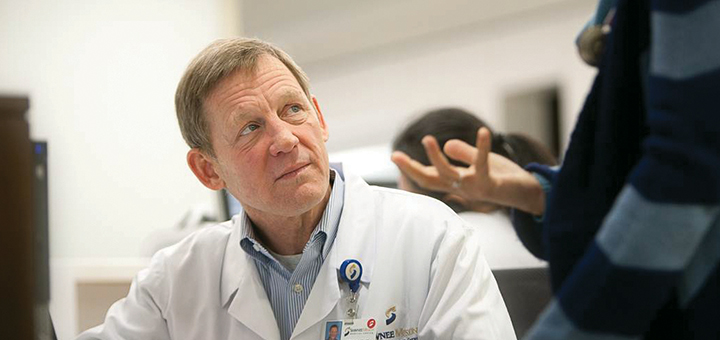Providing quality healthcare mandates a busy lifestyle for physicians, complete with an ever-growing list of tasks to juggle. From playing a leading role in the most critical part of patients’ lives to handling administrative duties and regulations, physicians often find it difficult to take a moment to focus on themselves and their own well-being.
“There are many factors changing the face of how medicine has traditionally been practiced,” said Gordon Kelley, MD, neurologist and member of the Shawnee Mission Health (SMH) Physician Well-Being Committee. “We are all facing growing mountains of red tape, frustration with the limitations of electronic medical records and loss of margin in managing our practices and time for our patients and families.”
By keeping themselves well in all aspects of their own health, doctors can provide the best care possible to their patients. SMH is committed to providing a high level of whole-person care not only for its patients, but for its physicians and their families as well.
Formed in 2009, SMH’s Physician Well-Being Committee is made up of 12 physicians from a variety of specialties, such as internal medicine, pediatrics, general surgery and family practice. The committee was formed “by the medical staff, for the medical staff,” said Kelley.
The committee promotes whole-person health in physicians and their families. They used a validated test, the Physician Well-Being Self-Assessment Tool, to survey the well-being of their medical staff last summer. The test gauges well-being on biophysical, psycho-emotional, socio-relational and religio-spiritual dimensions. While the medical staff scored favorably compared to national norms, Kelley says there is always room for improvement.
To foster a greater sense of community among SMH physicians and their families, the group helps plan community events throughout the year. A sample of this year’s events includes a Sporting Kansas City soccer game, a tour of the Nelson-Atkins Museum of Art, a golf tournament and a family trip to a children’s farmstead.
Positive, relaxing social interactions can play a pivotal role in the health of physicians, whose busy lives can leave little room to spend time with one another.
“We are increasingly isolated,” Kelley said. “Many doctors seldom get out of their offices, and we progressively know each other only by our letterheads.”
Kelley was inspired to get involved with SMH’s physician well-being projects by Steve Jeffers, former chaplain and director of Spirituality in Health at SMH.
“Steve was very concerned with the role of spirituality in healthcare,” Kelley said. “He had a way of coming up with one great idea after another to promote dialogue and growth and getting the rest of us [physicians] to volunteer to serve.”
To promote spiritual well-being in SMH’s physicians, Jeffers, Kelley and other physicians worked together to start the CARES (Compassion, Availability, Respect, Encouragement, Safety) support group 11 years ago.
The group consists of about 20 physicians who make themselves available to their colleagues if they need to talk about any of the stresses in their life or career. For physicians, a listening ear could play a crucial role in dealing with the challenges that come with such a demanding profession.
“There are the lawsuits, the divorces, and then there are all the other stresses all families are facing with the change in our culture and economy,” Kelley said. “I spent a couple of long phone calls consoling a doctor who was emotionally frustrated in the late phases of a lawsuit, and he is now one of our group members.”
Whole-person health is critical for physicians, since they not only provide care for their patients, but also serve as an example to their patients, families and peers.
“Doctors need to be healthy themselves to care effectively for others,” Kelley said. “I learned a long time ago when raising my children that we teach our best lessons by example.”
SMH’s focus on physician well-being is just one of the many ways it fulfills its commitment to providing much more than medicine.
Author Emily Becherer is a writer for Shawnee Mission Health.










